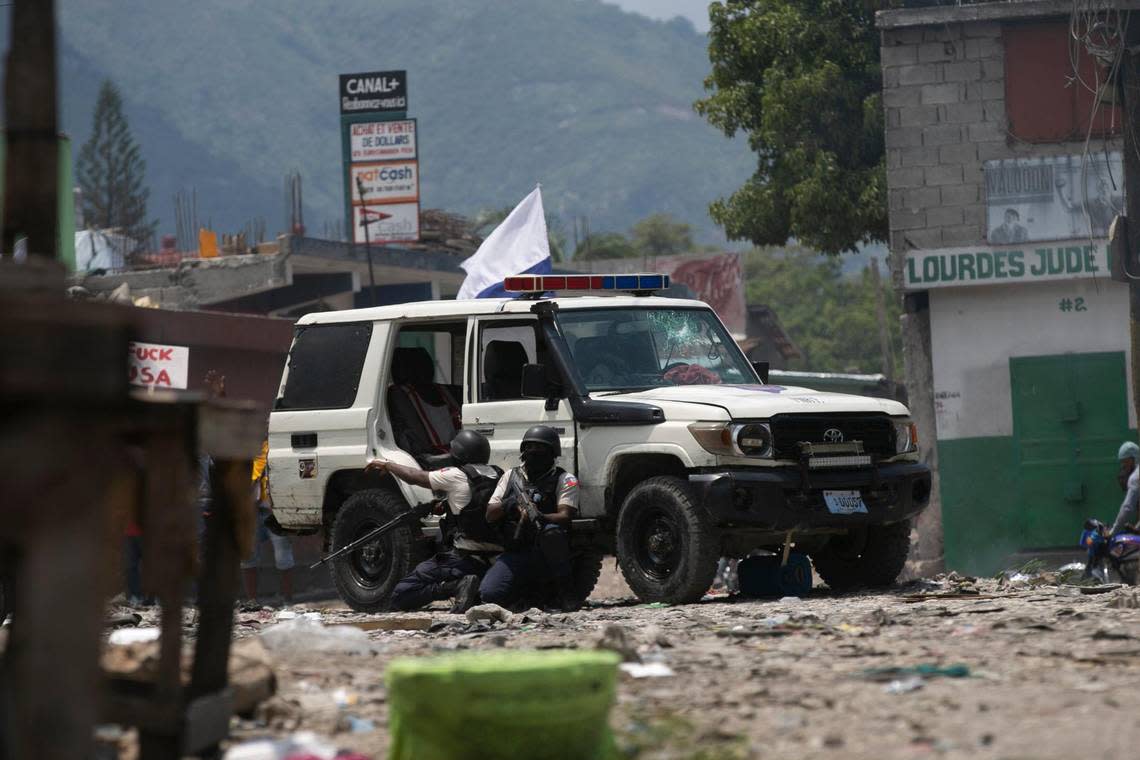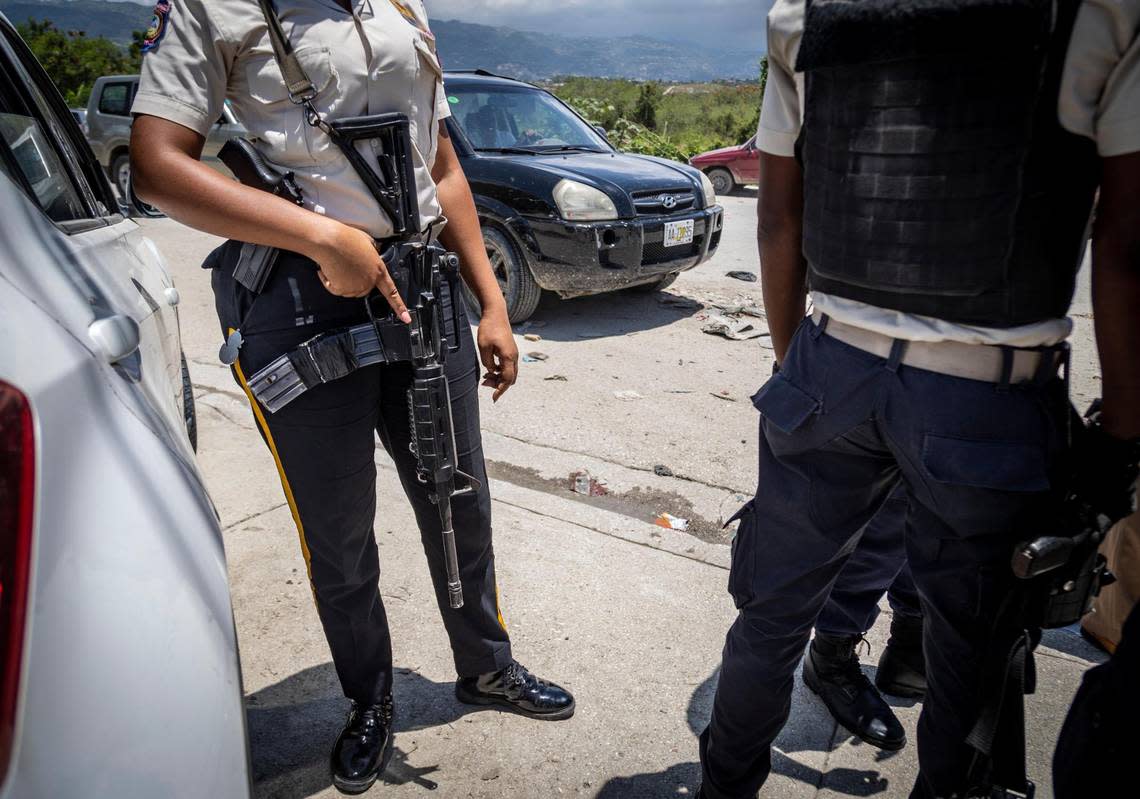Haiti police are still struggling. But here’s how they recently made strides against gangs
For months, the heavily armed gang members in Savien, a rural community in Haiti’s rice-growing Artibonite Valley, had been ratcheting up their terror campaign. When they weren’t brandishing their weapons openly in the streets, they were kidnapping people for ransom or stoking fear with viral videos showing the slaughter of unsuspecting individuals in fields.
So when a specialized police brigade unexpectedly crossed paths with the gang last month, some residents in Petite-Rivière de l’Artibonite weren’t sure what to expect. But the Haiti National Police officers not only fought off the gang’s attempts to storm the local police station, they killed at least three gang members, including the leader nicknamed “Goliath,” in an exchange of gunfire.
“The population was very happy,” said a local businessman who declined to give his name because of the fear of gangs
The welcomed victory is among several in a surprising month in which Haiti’s ill-equipped police force of 12,800 agents tracked down armed gang members and their leaders, arresting or killing them.
For their efforts, the police received thunderous applause and even hugs from an appreciative population. Haiti, according to police statistics being tracked by the United Nations Integrated Office in Port-au-Prince, saw a reduction in reported kidnappings and homicides during August compared to previous months.
It is the kind of effective policing that national and international observers say comes with coordinated efforts — and the kind, they say, that needs to continue if the Haiti National Police are to make any headway in confronting the country’s criminal gangs, which are increasingly spreading fear beyond the capital.
“The objective has not really changed,” said an official with the U.S. State Department, which last year allocated $15 million to helping with policing efforts in Haiti and recently pledged $48 million more. “We’re still trying to build capacity; we’re still trying to get them the equipment and transportation, both armored and unarmored, that they need. And we’re still trying to work on our end to stem the flow of illegal arms going back and forth.”

Police continue to face challenges, beginning with the effort to regain control of Martissant, the gang-infested neighborhood at the edge of Port-au-Prince that links the capital with four other regional departments. After more than a year, over 14,000 residents from the area and surrounding communities continue to be displaced by the violent gang clashes and Haitians still risk being kidnapped or killed when crossing the area.
Meanwhile, ongoing anti-government protests /in numerous cities continue to pose challenges for the beleaguered force. During demonstrations Wednesday several people, including journalists in Port-au-Prince and Cap-Haitien, were shot, reportedly by police trying to disperse the crowds. Some of the incidents raised questions about police behavior, and reinforced the need for a stronger oversight mechanism within the force to address misconducts and human rights violations.
On Thursday the police department’s office of internal affairs opened an investigation into allegations that anti-drug-trafficking officers may have participated in the killing of two people reportedly in the rural town of Terrier Rouge in Haiti’s northeast region, according to two sources with knowledge of the decision.
Also, a video being shared by journalists showed a specialized riot police officer advancing onto a man identifying himself as a journalist but ignoring the screams saying, “Press, press,” as a gun goes off. The journalist, who was heard questioning police about why they were firing tear gas, later screamed, “He shot me!”
Police officials did not respond to inquiries from the Miami Herald about the incident or to allegations that during the protests, some officers used live rounds, not just rubber bullets. The journalist, who confirmed to an investigator from the National Human Rights Defense Network that he was shot in the leg by the unidentified officer while standing in front of the Ministry of Planning, was released Thursday from the hospital and is recovering.
While the incidents don’t help the Haiti National Police’s struggling image, they also should not obscure the work they have been doing, supporters say, despite their continued lack of guns, bulletproof vests, ammunition and fuel for their vehicles.
An increase in the number of operations over recent months, particularly in gang-controlled Croix-des-Bouquets, Tabarre and parts of Delmas in metropolitan Port-au-Prince, have provided some respite from the gangs. The policing effort has been combined with an aggressive stance by the heads of the Central Directorate of the Judicial Police, the police’s investigative arm, and the country’s National Port Authority, which together have prioritized going after illegal weapons.
Recent seizures of high-caliber automatic rifles and thousands of rounds of ammunition at the seaports, and the arrests of several people accused of arms smuggling, including an Episcopal priest and a church accountant, have resulted in gangs being low on ammunition and their suppliers being afraid, several sources told the Herald.
“We’ve been doing a couple of things in that regard,” said the State Department official, who acknowledged the U.S. involvement in helping deter the smuggling of arms even after boats carrying the weapons arrive at Haitian seaports. He pointed to “the increased investigation by our joint unit, [Homeland Security Investigations] and the Haitian National Police, and their work with the Coast Guard.”
The State Department official conceded that the security situation in Haiti remains “grave.” However, efforts are being made, he said, to help build the capacity of the police so that the recent successes in anti-gang operations and trafficking investigations are more the norm than the exception.
“We are getting more and more subject-matter experts on the ground, whether it be internally for the HNP; working with specialized units, including the counter narcotics unit, and working with anti-gang, more community and social-based groups,” said the official.
One dead as protests in Haiti against the banking system and government turn violent
Last week, while attending a meeting of chiefs of police at the United Nations, Haiti Interim Police Chief Frantz Elbé gave an overview of the work being done to strengthen the force. He stressed that the difficult task requires cooperation between various players, both in the country and in the international community.
“The security environment in Haiti has deteriorated over the last two years with the proliferation of armed groups perpetrating all sorts of violence,” Elbé said. “The police cannot address these multidimensional problems that Haiti is experiencing alone.”
Case in point: The businessman in the Artibonite Valley said that while the police crackdown on the Savien gang provided some relief, the population is still awaiting radical change. A month later, roads in the community remain difficult to travel because of armed groups, and people still live in fear.
“No one is certain of anything,” he said.

To help policing efforts, the U.N. has established a $28 million fund managed by the United Nations Development Program. So far, it has received just $8 million from Canada while the government of Haiti has provided $1 million directly to the United Nations Office on Drugs and Crime a container inspection project.
With $20 million more needed, Canada and the U.S. have scheduled a donors’ meeting on Haiti on the sidelines of this month’s United Nations General Assembly meeting.
In addition to its donation, Canada recently guided Haiti through a purchase of several armored vehicles from a private vendor. Meanwhile, France and the U.S. are training a new SWAT team to go after the gangs.
The U.S. said while it doesn’t plan to pay the newly trained officers, it has experts working with the Haitian police on the administrative side to make sure that “everybody gets paid” — an ongoing issue within the force. The U.S. is also vetting the officers by performing background checks and using polygraphs to root out bad cops.
“We are going above and beyond what we usually do,” said the State Department official. “Some of them are just regular [Haiti National Police] but even those that are getting our training need to be polygraphed. That’s part of the reason why things are taking a little longer than usual.”
The effort is a major logistical operation, the official added, while noting that the U.S. is trying to provide the new squad with radios, helmets and all of the personal protective equipment they will need in order to regain control of gang-controlled streets. Also, in a first, the officers will be outfitted with body cameras, both to track their efficiency and to protect against human-rights violations.
But for now, the wins shown last month are being recognized.
“They’re doing a better job of touting their own successes and showing that, given the tools and the training and support, both locally and internationally, they can actually do a better job of going after the gangs,” the U.S. official said.
